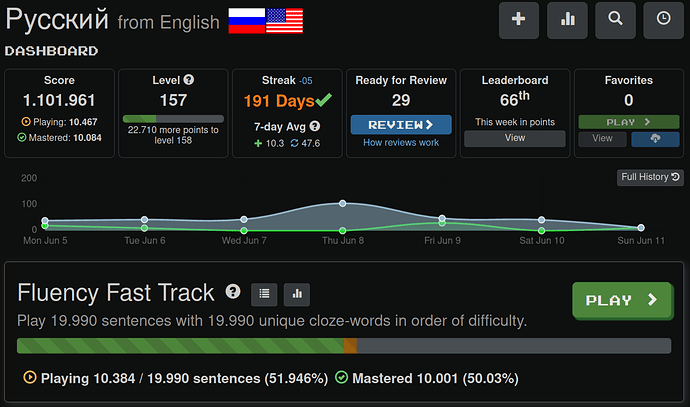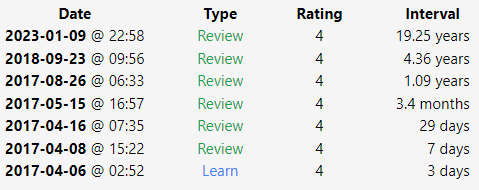Hello all,
After a few years of diligent use, I managed to reach 10 thousand mastered words in the Russian “Fast Track” today:
I enjoyed the journey but I also think I’m not going to make it to the full 20k. I think it’s time for me to drop Clozemaster for Russian, I don’t get enough out of it anymore.
Paradoxically the thing that makes ClozeMaster less useful for me at this point is also the thing that made it so great at the start: unlike many other vocab SRS tools, ClozeMaster considers different forms of a word (conjugations/declensions) to be distinct. That means that you get to practice vocab in all sorts of grammatical constructions instead of just dictionary form like most other tools (in my experience).
For a language like Russian with tons of declensions I find it extremely valuable, since it forces you to think about grammar instead of just rote memorization of words.
Unfortunately I feel like after a while you get the other side of the coin: because a single noun in Russian has potentially a dozen forms, you tend to get the same words again and again and again with different forms instead of learning more vocab.
As an example, here’s what my new lessons look like:
Тебе нужно получить нормальную работу.
The cloze is the adjective “normal” in the feminine accusative.
Они не желают с вами разговаривать.
The cloze is the verb “to want”, third person of the plural.
Небо - над нашими головами.
The cloze is “head” in the instrumental plural.
Свяжись с ней.
The cloze is “to get in touch/to contact” in the perfective imperative.
All of these are trivial words I know full well and I’ve probably encountered (some of them multiple times) in ClozeMaster.
I would guesstimate that at this point for ever 10 lessons I get maybe 2 words I feel worth studying, and honestly it may be even less than that.
Of course I can just manually tag these entries as known and keep doing lessons until I find something useful, but that’s a lot of busywork and I’m lazy.
I’m not sure how ClozeMaster could improve on this, and again overall I got a lot out of this website and I absolutely don’t regret having gone through all of this. I just felt like offering some feedback.
Thank you for this website and keep up the good work!

